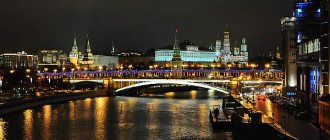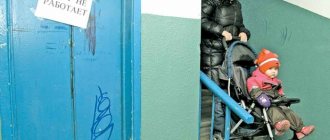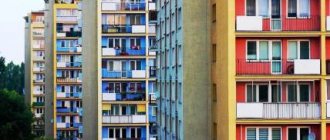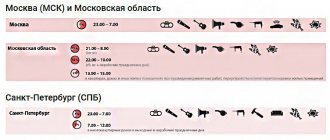Legal basis of the silence law
In addition to the capital act, two documents are of central importance in regulating the silence regime: Federal Law No. 52 of 1999 and Decree of the Government of the Russian Federation No. 47 of 2006.
Federal law classifies noise as a harmful condition that impairs the health of citizens.
What can be considered noise under the law?
The permissible noise level is established by by-law - in Decree of the Government of the Russian Federation No. 47. According to the provisions of the document, the maximum permitted sound level during the day is 55 decibels, and at night - 45 decibels. In this case, the noise from ventilation and other equipment should be 5 dBA lower than the specified values. If the established permissible sound level limits are exceeded, then the residential premises do not meet the requirements for habitability.
When can you make noise in an apartment in Moscow?
The capital's legislation on silence is developed according to the principle “ everything is permitted, except what is prohibited .” This means that making noise in an apartment in Moscow is allowed as a general rule, with the exception of cases that are expressly specified in the law.
From what hours can you make noise on weekdays and on weekends?
In accordance with Article 3.13 of the Moscow Code, which establishes sanctions for administrative violations, making noise on weekdays and on weekends is permissible during the daytime (from 7:00).
How much noise can you make on weekdays and weekends?
As a general rule, you can make noise on weekdays and weekends until 23:00.
When can you renovate your apartment?
Repairs (including replanning and refurbishment) are possible only on weekdays (including Saturdays). it is PROHIBITED to carry out repair work on holidays and Sundays . The legislator also established two time periods during which it is prohibited to carry out repairs on weekdays:
- from 19:00 to 9:00;
- from 13:00 to 15:00.
In all other cases, repair work is permitted as a general rule.
Noisy work in Moscow and new buildings
The law on silence in Moscow allows renovations to be carried out in new buildings on holidays and Sundays (from 7:00 to 23:00).
However, the permit is valid only for one and a half years after the house is put into operation.
We recommend reading: “6 practical tips on how to avoid becoming hostage to your neighbors’ eternal repairs.”
What is considered noise
There are 2 official documents that regulate the issue of permissible noise standards:
- SanPiN 2.1.2.1002-00.
- Sanitary standards SN 2.2.4/2.1.8.562-96.
If we simplify the standards set out in them a little, it turns out that during the daytime in apartments you can make noise up to a level of 55 dBA, and at night - up to 40 dBA. In the local area - 70 dBA and 60 dBA, respectively. Of course, few people have a special device to measure decibels. To understand the noise level, you need to focus on the following data:
- 30 dBA - quiet muffled conversation, computer noise;
- 40 dBA - noise of the refrigerator, everyday speech;
- 50 dBA - the sound of a typewriter or a boiling kettle;
- 60 dBA - communication in a raised voice, TV sound at medium volume;
- 70 dBA - the noise of an old (Soviet) vacuum cleaner, sounds during a quarrel;
- 80 dBA - the cry of a baby, the noise of cars on the Moscow Ring Road.
Much depends on the soundproofing of the premises. Therefore, in some houses, even the noise of a hammer drill (130 dBA) can be relatively comfortable for neighbors, and in some rooms even a whisper can be heard on 3-4 floors.
However, not all noise is subject to legal restrictions.
You don’t have to worry about the reaction of your neighbors and fines in the following cases:
- emergency situation and work to eliminate it;
- alarm activation, including accidental;
- crime prevention.
Cleaning work in local areas, officially registered concerts, sporting and social events are not considered noise and must simply be tolerated, with the windows tightly closed. Also, a person at home can quietly cough loudly, sneeze and snore at any time.
What actions are prohibited
Moscow Law on Silence No. 42 of 2002 prohibits at night:
- use televisions, tape recorders, stereos and other devices that reproduce loud sound;
- sing, play instruments, and perform other similar actions that disturb peace;
- use car alarms;
- launch firecrackers, fireworks and other pyrotechnic products;
- repair, build, load and unload.
The list is open. This means that any action that disturbs the peace of citizens and the established silence is prohibited by law.
Article on the topic: “How to make an anonymous call to the police: procedure.”
Exceptions to the rules
The ban on disturbing the silence in an apartment building does not apply in cases where citizens or organizations:
- prevent crime or accidents;
- eliminate the results of accidents, natural disasters and other emergencies;
- carry out urgent work that affects the safety of the population;
- carry out religious rituals within the established requirements.
In addition, the law on silence in Moscow does not apply in the case of offenses for which sanctions are provided at the level of federal laws.
For example, the offender periodically hit the cars, causing the alarm to go off. The offender’s actions fall under petty hooliganism under Article 20.1 of the Code of Administrative Offenses of the Russian Federation.
Deadlines for payment of fines
According to Art. 32.2 of the Code of Administrative Offenses of the Russian Federation, an administrative penalty is paid no later than 60 days from the date of entry into force of the decision to impose a fine. The latter acquires legal force 10 days after receipt by the culprit. That is, after the violator receives the resolution, he has 70 days to pay the fine.
Failure to pay within the specified period entails punishment - an increase in the penalty by 2 times (at least 1 thousand rubles) or arrest for up to 15 days, or compulsory work for up to 50 hours.
Prosecution is permissible up to 3 months after late payment. If it does not happen, the enforcement proceedings are automatically terminated, and collection is no longer threatened.
Administrative responsibility
Disturbing the peace of the population is punishable under the Moscow City Code No. 45 of 2007 in the form of a warning or a fine.
Penalties
Citizens who violate the law on silence in Moscow must pay a fine of 1,000 to 2,000 rubles. For officials, the size of the sanction is from 4,000 to 8,000 rubles, for organizations - from 40,000 to 80,000 rubles.
Brief overview of 52-FZ
Article 1 establishes the basic concepts used in the text of the act. In particular, it is revealed that the sanitary and epidemiological well-being of the population of Russia is the state of health of citizens, the human environment, in which there is no harmful impact of environmental factors and favorable living conditions are provided.
The entire Chapter 1 is devoted to the functioning of the sanitary and epidemiological surveillance system in the state and the definition of powers at various levels.
Chapter 2 defines the legal status of subjects (citizens, legal entities), their rights and obligations.
Chapter 3 contains the requirements that must be met to ensure human safety:
- when planning and developing buildings;
- in the production of various products (from technological to food);
- when importing goods into the territory of the Russian Federation;
- in relation to water, air, soil with which a person comes into contact;
- in waste management;
- when children are on vacation;
- when employees perform labor functions;
- when working with organic and chemical substances, toxins, microorganisms;
- in the process of using industrial and public structures, as well as equipment and transport.
Chapter 4 characterizes sanitary, anti-epidemic and preventive measures: quarantine, production control, medical examinations, vaccinations, etc. Chapters 5 and 6 are devoted to issues of state regulation of the sanitary well-being of citizens, problems of control and supervision in this area. Chapter 7 contains rules regarding liability for violation of sanitary legislation.
Since the main topic of the publication is the “law on silence,” then in 52-FZ the article on the peace and quiet of citizens interests us in the first place. This is Article 23 of Chapter 3 of the regulatory act in question.
What to do if neighbors violate the law on silence
There are two ways to resolve a conflict situation with noisy neighbors: peaceful resolution and filing a complaint with law enforcement agencies.
Peaceful settlement
The most common way is to try to negotiate with the silence breaker and demand that they stop making noise at prohibited times. If the negotiations failed, then it is necessary to act in a different way.
You will be interested in reading: “Quiet mode in an apartment building: how to legally find justice for a noisy neighbor.”
Where to complain
It all depends on the source of the noise pollution. You can complain to:
- police if neighbors are noisy;
- Rospotrebnadzor, if the ventilation/other equipment or organization (for example, retail facilities) is noisy;
- Department of Natural Resources, if construction is taking place;
- OATI (Association of Administrative and Technical Inspections), if noise is generated by garbage disposal or municipal equipment.
The applicant may be present at the noise level measurement if law enforcement agencies are involved.
Calling a police officer
In practice, most situations are regulated by contacting the main law enforcement agency - the police.
Drawing up an application
The application must contain the circumstances of the offense, information about the applicant and a requirement to bring the violators to justice. A sample application, as well as writing rules, can be found in the article: “Application to a district police officer against unlucky neighbors: pitfalls, writing samples.”
How to avoid punishment for noise
The most effective way to avoid punishment for noise is not to violate the law on silence in Moscow. If the prosecution procedure has already been launched, then it makes sense to demand sound level measurements. In such a situation, you can avoid liability if the noise was below the established limit. How to correctly measure the noise level and take into account all the subtleties of this procedure, read the article: “Measuring the noise level (dBA) in an apartment.”
An alternative way is to provide arguments that support exceptions to the rule. For example, to prove that the noise arose as a result of preventing a crime.
How to bring noisy neighbors to reason?
There are plenty of ways to influence lovers of noisy pastimes. Here is a list of effective actions aimed at resolving the conflict.
Which one to choose depends on the specific situation:
- try to explain to your neighbors that they are wrong and ask them to stop their illegal actions. Mostly, this method works immediately, and the following actions are no longer necessary;
- Call the police. Some neighbors, despite their boorish attitude, will still not argue with law enforcement officers and will stop making noise and disturbing vacationing citizens;
- Seek help separately from the local police officer if the Police squad was unable to influence the violators in any way. The apartment will be registered and periodically visited for control;
- contact the judicial authorities. This method is suitable for persistent offenders who constantly organize loud night parties, drinking and dancing within the residential area;
- dissatisfied residents can also draw up a collective complaint and submit it to the local administration for consideration. In the worst case scenario for the offender, the court will deprive him of his apartment.
Territories protected by law
The text of the law on silence in Moscow No. 42 establishes the territories in which it is prohibited to exceed the permissible noise level:
- medical institutions (including hospitals and sanatoriums);
- preschool institutions and social service facilities;
- residential premises (including hotels and hostels);
- public facilities (including entrances, elevators and other areas);
- recreation areas.
Territories that directly relate to medical institutions, kindergartens, hotels, residential buildings and social service organizations are also protected.











